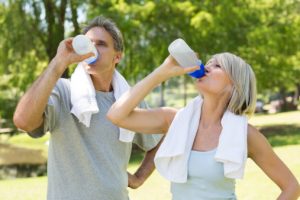
Less than 75 percent of Americans consume the recommended amount of water throughout the year, according to the Institute of Medicine. Sixty percent of our bodies is comprised of water, so hydration throughout the day is essential – particularly, when you are sweating more.
Dr. Robert G. Silverman, a New York-based doctor, said, “Dehydration means you have a negative fluid balance in your body — you’ve lost more water than you’ve taken in.”
“Mild dehydration is common and easily treated simply by drinking plain water. If you get badly dehydrated, however, you might need an IV to replace lost fluids and get your electrolytes back into balance. If more severe dehydration isn’t treated promptly, it can cause fainting, low blood pressure, heart palpitations, dizziness, and decreased urine output. Severe dehydration can even lead to death from kidney failure or cardiac arrest… If you have diabetes, getting dehydrated can raise your blood sugar to dangerously high levels. Fortunately, if dehydration is treated promptly, a quick and complete recovery is very likely,” he continued.
It is worth noting that dehydration is not a seasonal problem that loses its relevancy once the summer is over. In fact, it can happen any season if you aren’t taking in adequate amounts of water. Summertime dehydration often results from excess sweating, especially during an outdoor physical activity. In diabetics, dehydration could be a result of their condition.
In order to reduce your risk of dehydration and the associated complications, it’s important to spot the signs your fluid intake is low. The most common sign of dehydration is a dry mouth. If you don’t drink more water after spotting this initial sign, your skin may appear flushed and you may start feeling dizzy or nauseous.
Silverman explained, “More serious dehydration symptoms include dizziness, fatigue, weakness, mental confusion, and fainting. Even more serious are the inability to sweat and decreased urination or no urination at all.”
A pale yellow or almost clear urine is a good indicator of getting in enough water. If your urine is dark yellow, you need to drink more water.
Keeping water close by will remind you to stay hydrated. Take breaks during a physical activity to hydrate yourself, and if it’s a particularly hot day, avoid outdoor activities that may produce excessive sweat and thus make you lose water too quickly.
Dehydration can lead to kidney stones and cardiac arrest
Kidney stone cases tend to spike in the summer months as more people are not drinking enough water and end up dehydrated. Dr. David Grossklaus, urologist, explained, “It will clearly affect patients who already have kidney stones, and may, in fact, cause kidney stones in those patients who are dehydrated. When it’s hotter, that four to five glasses [of water] a day is not enough, so they really need to drink more.”
A safe rule is to consume eight glasses of water a day, but this can very much change based on one’s activity level. Basically, the more you sweat the more water you will need to drink to keep yourself hydrated.
Other studies have shown that dehydration can lead to sudden cardiac arrest. But how does sweating and dehydration contribute to a heart event? Well, loss of fluids means less fluid in your arteries, leading to constricted blood vessels and causing the heart to pump more. Additionally, excessive sweat causes mineral imbalance, which also contributes to irregular heartbeats. In a nut shell, low blood supply, overused heart, and irregular heartbeats can ultimately lead to sudden cardiac arrest.
The good news is, you can prevent kidney stones and cardiac arrest by staying well hydrated and paying attention to the early signs of dehydration listed above.
Related: Low oxalate diet: Healthy eating guidelines to prevent kidney stones